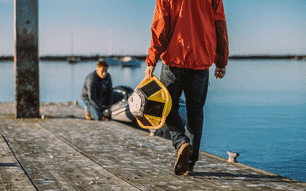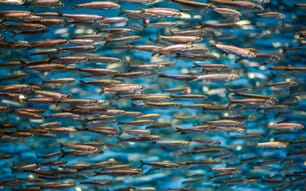Senator Richard Colbeck, Parliamentary Secretary to the Minister for Agriculture, said the operator of the Geelong Star is Seafish Tasmania, an Australian fishing company that has been fishing in
Australia's southern waters for more than 30 years. The vessel will be operated by a largely Australian crew.
“The 95m vessel will not be eligible to fish until the Australian Fisheries Management Authority (AFMA) has approved a tailored Vessel Management Plan (VMP) to ensure potential interactions with marine mammals and seabirds will be minimised through measures such as compulsory use of an approved marine mammal excluder device in the nets,” Senator Colbeck said.
“The VMP cannot be finalised until AFMA physically inspects the boat. AFMA will also apply management measures to address the potential of localised depletion, which has been assessed low risk.”
A recent scientific report found:
“Localised depletion is evaluated as unlikely with the proposed harvesting fractions applied in the SPF because most small pelagic species...are highly mobile and local areas replenish quickly provided the overall stocks are not depleted.” (The Commonwealth Small Pelagic Fishery: General background to the scientific issues)
Senator Colbeck said vessels fishing in the Small Pelagic Fishery are fitted with a mandatory GPS tracking system and will carry independent observers for at least the first 10 trips, and regularly after that.
The vessel will also be required to land all catch in Australia to a licensed Commonwealth fish receiver; fisheries officers will regularly conduct landing inspections.
“I recognise that some people have concerns about the size of vessels operating in our fisheries, that is why the Australian Government has said fishing vessels greater than 130 metres will not be permitted to fish in Australian waters,” Senator Colbeck said.
“Australia adopts conservative catch limits for all Commonwealth fisheries. The Small Pelagic Fishery catch is currently set at 7.5 per cent of the total estimated fish population, meaning 92.5 per cent of the estimated fish stock is left in the water.”
“This Government is committed to an informed approach to fisheries management. That is why we have invested A$1.5 million in independent research to refresh our data on the current size of many Australian small pelagic fish stocks.”
The first results from this research will be available in March and will assist in setting total allowable catches for the Small Pelagic Fishery from 1 May 2015. Until the new survey results are available, conservative catch limits are set based on earlier survey data.
Initial results from this research suggest that the spawning biomass for Jack Mackerel may be similar with previous findings. This analysis will be reviewed by independent scientific experts prior to it being finalised.
Senator Colbeck said the Government has done what we said we would do, by undertaking further research on commercial species and having an independent expert panel examine the potential environmental impacts of the operation of large mid water freezer-trawler in the Small Pelagic Fishery.
“Last week we released the latest science from CSIRO (Review and update of harvest strategy settings for the Commonwealth Small Pelagic Fishery) which found that SPF target species have only minor impacts on other parts of the ecosystem, as alternative food sources exist for large predators such as tuna, seals and penguins,” he said.
"None of the key higher trophic level predators in SE Australia, such as seals, penguins and tunas, has a high dietary dependence on these species." (Review and update of harvest strategy settings for the Commonwealth Small Pelagic Fishery)
“It’s important that we strike the right balance between conserving natural resources and having sustainable industries: sound science will continue inform all decisions regarding access to all Australian fisheries.”
“I am satisfied that the current management of Australian fisheries, including the Small Pelagic Fishery, is based on the best available science, protects the future of our natural resources and lays the foundation for a sustainable Australian fishing industry.”



